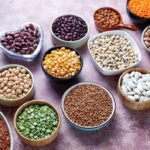While many foods provide essential nutrients, some can become harmful under specific health conditions. People with certain medical conditions must be cautious about their food choices, as certain ingredients or compounds can exacerbate their symptoms or pose severe health risks. Here are 10 common foods that can be toxic or harmful under certain health conditions.
1. Grapefruit
Grapefruit is rich in vitamins and antioxidants, but it can interfere with various medications. People taking medications for high blood pressure, anxiety, cholesterol, and some heart conditions should avoid grapefruit. It inhibits the enzyme CYP3A4 in the liver, which can lead to dangerously high levels of these medications in the bloodstream, increasing the risk of side effects.
2. Leafy Greens (Spinach, Kale)
While leafy greens are packed with nutrients, they contain high levels of vitamin K, which can interfere with blood-thinning medications such as warfarin. People on anticoagulants must monitor their intake of leafy greens to prevent complications like excessive clotting or bleeding.
3. Tuna (and Other Large Fish)
Tuna is high in protein and omega-3 fatty acids, but it can contain mercury, which poses risks to people with kidney disease or pregnant women. Mercury can affect brain development in fetuses and accumulate in individuals with reduced kidney function, leading to toxicity.
4. Soy Products
Soy is often used as a plant-based protein alternative, but it contains compounds that mimic estrogen. People with thyroid conditions or hormone-sensitive cancers, such as breast cancer, should be cautious with soy. Excessive consumption may interfere with thyroid function or exacerbate hormone-driven cancer risks.
5. Tomatoes
Tomatoes are generally healthy, but they are highly acidic. For individuals with acid reflux (GERD) or stomach ulcers, consuming tomatoes can exacerbate symptoms, causing discomfort, heartburn, or even damage to the esophagus or stomach lining.
6. Black Licorice
Black licorice contains glycyrrhizin, which can lead to potassium depletion, causing high blood pressure, irregular heart rhythms, and even heart failure in extreme cases. People with cardiovascular issues or those on medications like diuretics should avoid black licorice, as it can worsen their condition.
7. Processed Meats (Bacon, Sausages)
Processed meats are often high in sodium and preservatives, such as nitrates and nitrites. For individuals with high blood pressure, kidney disease, or heart conditions, consuming these meats can lead to fluid retention, high blood pressure spikes, and increased risk of heart attack or stroke.
8. Mushrooms (Certain Varieties)
While most mushrooms are safe to eat, some, like wild mushrooms, can be toxic even in small amounts. People with liver conditions should be cautious, as toxic mushrooms can lead to liver failure. Always opt for store-bought mushrooms and avoid foraging unless you’re an expert.
9. Gluten (Wheat, Barley, Rye)
For people with celiac disease or gluten intolerance, gluten can trigger an immune response that damages the small intestine, leading to nutrient malabsorption, digestive issues, and even long-term health complications like osteoporosis or anemia. Gluten-containing foods must be strictly avoided.
10. Dairy Products
While dairy is an excellent source of calcium and protein, those who are lactose intolerant cannot digest lactose, the sugar in milk. Consuming dairy can lead to symptoms like bloating, gas, and diarrhea. People with lactose intolerance should choose lactose-free or plant-based alternatives to avoid digestive discomfort.
While many of the foods listed above are staples in a healthy diet, they can become harmful under certain health conditions. If you have a chronic illness or are taking medications, it’s essential to be aware of how your food choices may impact your health. Always consult with a healthcare provider to understand which foods to avoid or limit to prevent unwanted health complications.








